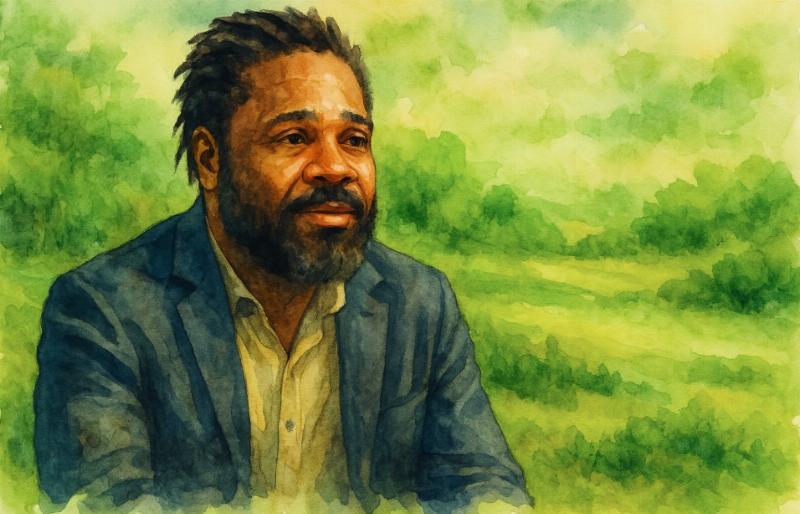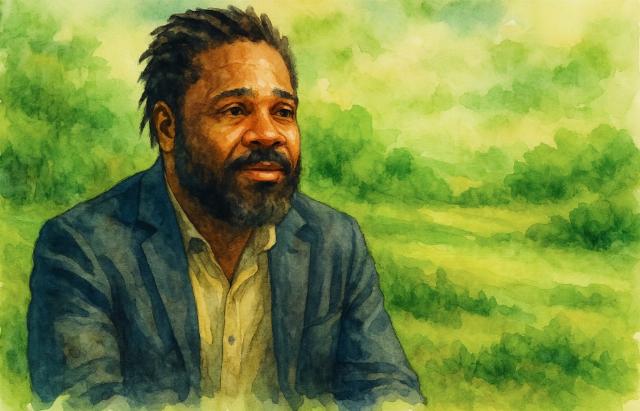


The rule of three struck with a vengeance this week as three men associated with Baby Boomers passed away. The most famous was Hulk Hogan, who gave a powerhouse performance at the Republican Party Convention last summer. Also gone are flugelhorn player Chuck Mangione, whose “Feels So Good” was one of the soundtracks to my high school years, and Malcolm-Jamal Warner, who played Theo Huxtable, the teenage son in the iconic Cosby Show, which debuted in 1984.
While all three men have a place in the American cultural pantheon, I want to talk about Malcolm-Jamal Warner, not only because he was an eminently likable actor, but also because he will forever be associated in my mind with a moment when black culture seemingly shook off the notion of victimhood forever.

Image by ChatGPT.
For my children’s generation, Bill Cosby is a sexual predator. For me, though, Bill Cosby was America’s funny father. He also marked an important break with the previous decade of TV’s funny fathers. In the 1950s, TV’s fathers were wise. Whether in Father Knows Best, Leave It To Beaver, or The Adventures of Ozzie and Harriet, fathers gave the family financial stability, wisdom, and emotional ballast.
That trend was still apparent in some shows in the 1960s and 1970s, shows such as The Andy Griffith Show, My Three Sons, The Brady Bunch, The Waltons, etc. Increasingly, though, the trend was to show fathers who were feckless, foolish, and ineffectual. That, after all, was the goal with Archie Bunker, who, to his creators’ shock, proved to be enormously popular because, in his crude, tactless way, he stood up to the leftist shibboleths that were sweeping America. Even more than that, they weren’t there at all (e.g., Alice and One Day At A Time).
Just as fathers were vanishing from TV screens, they were vanishing from American homes, especially from black American homes. According to ChatGPT, which is probably accurate, in 1960, roughly 22% of black children lived in a single-parent home (and we know that single-parent almost invariably means single mother). By 1984, 55-60% of black children lived in a single-parent home.
And then, suddenly, as Reagan was gearing up for his second term, The Cosby Show debuted. This time, it wasn’t a black family struggling with urban poverty (Good Times), a junk man (Sanford and Son), or a cocky, rough dry cleaner made good (The Jeffersons). Instead, Cliff Huxtable was a doctor, and his wife, Clair, was a lawyer. They were affluent, living in a comfortable Manhattan brownstone with their five children.
However, in the very first episode, the show made the point that it was not going to be about blackness or unearned wealth. It was going to be about values (which makes it all the more ironic that Bill Cosby’s personal values later proved to be so perverse). And this is where Malcolm-Jamal Warner comes in.
The affable Warner played the Huxtables’ only son, Theo, who was (I guess) around 14. He came home from school with an abysmally bad report card, and Clair sent Cliff in to bring young Theo to his senses.
In their first interaction, Theo explains that he doesn’t want to go to college, but instead wants to be a “regular person.” This leads to a comedic economics lesson of the type many of America’s college professors and other Democrats would do well to study:
However, it’s what came after this scene that has stuck with me for over forty years. Young Theo explains to his dad that his dad shouldn’t have high expectations but should love him as he is—a typical statement from the therapeutic culture of the 1970s. The laugh track applauds and, across America, Baby Boomers, raised on this idea, nodded approvingly, while their elders shook their heads in a “What has this country come to” way.
And then, Cosby did the unexpected. Instead of hugging Theo in accepted 1970s fashion, he said, “That’s the dumbest thing I’ve ever heard in my life.” His son is going to aspire and work hard:
That was a Reagan-era ethos, and that was an ethos that was being pumped directly into popular culture—especially black popular culture.
And then Obama threw it all away.
Rest in Peace, Malcolm-Jamal Warner, who drowned while on vacation with his family, aged only 54. You were a charming actor, a young man who managed his fame with grace, and someone who was part of an important message.
